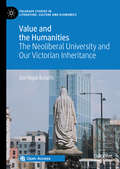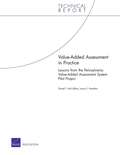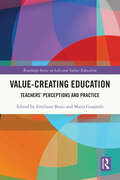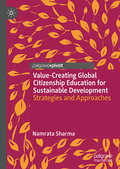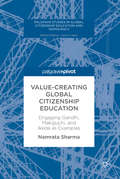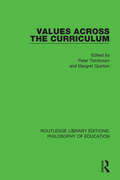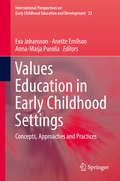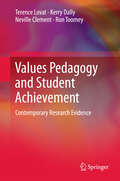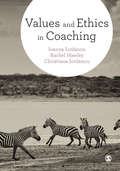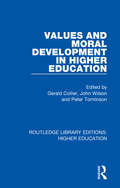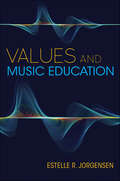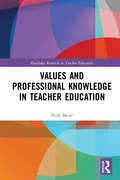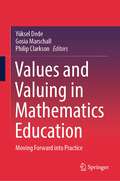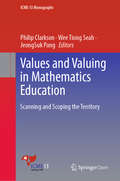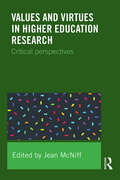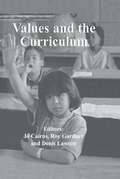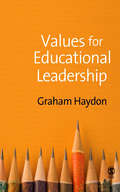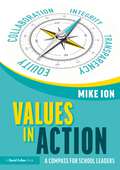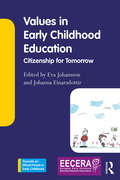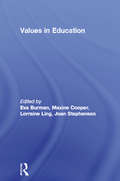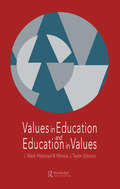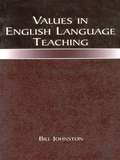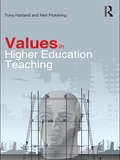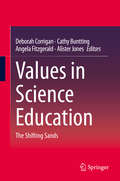- Table View
- List View
Value and the Humanities: The Neoliberal University and Our Victorian Inheritance (Palgrave Studies in Literature, Culture and Economics)
by Zoe Hope BulaitisTracing the shift from liberal to neoliberal education from the nineteenth century to the present day, this open access book provides a rich and previously underdeveloped narrative of value in higher education in England. Value and the Humanities draws upon historical, financial, and critical debates concerning educational and cultural policy. Rather than writing a singular defence of the humanities against economic rationalism, Zoe Hope Bulaitis constructs a nuanced map of the intersections of value in the humanities, encompassing an exploration of policy engagement, scientific discourses, fictional representation, and the humanities in public life. The book articulates a kaleidoscopic range of humanities practices which demonstrate that although recent policy encourages higher education to be entirely motivated by outcomes, fiscal targets, and the acquisition of employability skills, the humanities continue to inspire and aspire beyond these limits. This book is a historically-grounded and theoretically-informed analysis of the value of the humanities within the context of the market.
Value-Added Assessment in Practice
by Laura S. Hamilton Daniel F. MccaffreyValue-added assessment (VAA) systems use statistical techniques to analyze test-score data; VAA data is intended to help educators make more informed decisions about curriculum and instruction. The authors examined the rollout of Pennsylvania's VAA program, and found that, in its pilot phase, the program had little effect on student achievement and received limited use by most principals and teachers at schools participating in the program.
Value-Creating Education: Teachers’ Perceptions and Practice (Routledge Series on Life and Values Education)
by Emiliano Bosio Maria GuajardoOffering a pivotal reference point and a wide range of global perspectives of teaching experiences on value-creating education (VCE), this book is a timely spotlight on contemporary issues of globalisation that many educational institutions around the world may encounter. It contributes to the originality of constructing new knowledge in the field of VCE, a forward-looking framework, and an ethical and educational imperative that can be understood in different ways, from diverse theoretical orientations. The chapters written by experienced international educators explore the following questions: How do educators understand the role of VCE? What pedagogical approaches to VCE do educators employ in their classes? How do educators support the values and knowledge of VCE in all curricular areas? What do educators see as the key essential values and knowledge that students should develop through VCE? It offers valuable insights and applied pedagogical practices for postgraduate students, researchers, educational policy makers, curriculum developers, and decision-makers in higher education institutions and non-governmental organizations (e.g., UNESCO, OXFAM).
Value-Creating Global Citizenship Education for Sustainable Development: Strategies and Approaches (Palgrave Studies in Global Citizenship Education and Democracy)
by Namrata SharmaThis volume brings together marginalized perspectives and communities into the mainstream discourse on education for sustainable development and global citizenship. Building on her earlier work, Sharma uses non-western perspectives to challenge dominant agendas and the underlying Western worldview in the UNESCO led discourse on global citizenship education. Chapters develop the theoretical framework around the three domains of learning within the global citizenship education conceptual dimensions of UNESCO--the cognitive, socio-emotional, and behavioral--and offer practical insights for educators. Value-creating global citizenship education is offered as a pedagogical approach to education for sustainable development and global citizenship in addition to and complementing other approaches mentioned within the recent UNESCO guidelines.
Value-Creating Global Citizenship Education: Engaging Gandhi, Makiguchi, And Ikeda As Examples (Palgrave Studies In Global Citizenship Education And Democracy Ser.)
by Namrata SharmaThis book fills an existing gap within the practice of global citizenship education by offering Asian perspectives. In this book, Soka or value-creating education developed by the Japanese educators, Tsunesaburo Makiguchi (1871-1944) and Daisaku Ikeda (b. 1928) is compared to the ideas of the Indian political leader Mahatma Gandhi (1869-1948). This study of their respective thoughts and movements has a significant bearing on the three domains of learning within the global citizenship education conceptual dimensions of UNESCO – the cognitive, socio-emotional, and behavioral. This book deftly combines theoretical discussions with themes and suggestions for practice and future research.
Values Across the Curriculum (Routledge Library Editions: Philosophy Of Education Ser. #18)
by Peter Tomlinson; Margret QuintonThe background to this book, first published in 1986, and its underlying concern lies with those aspects of education which relate to values. Amongst these, moral and social values are often thought of as central, and they are the title’s primary concerns. The study also deals with the value aspects and implications of the major areas of the sec
Values Education in Early Childhood Settings: Concepts, Approaches And Practices (International Perspectives on Early Childhood Education and Development #23)
by Eva Johansson Anette Emilson Anna-Maija PuroilaThis book is about values education in early years settings and discusses theory and concepts, as well as methodological and empirical perspectives. It explores issues such as the kinds of values that are communicated between educators and children and the kind of future citizens we foster in early childhood settings. It illustrates by way of cases involving many participants, including children, educators, and researchers, who have their roots in diverse contexts, and reside in different parts of the world, including Australia, Denmark, Finland, Iceland, Norway, Slovenia, and Sweden. The book carefully considers the contextualized character of the cases presented, yet argues that the questions, theories, and methodologies emphasized do inform the international debate in manifold ways. Communication of values in a broad and diverse sense is central in any pedagogy, especially for the youngest children in the educational system. Still, values education has been neglected as a research field, in education in general and particularly in the early years. This book addresses this lack of knowledge by scrutinizing various questions about values education in ECEC settings.
Values Pedagogy and Student Achievement
by Terence Lovat Kerry Dally Neville Clement Ron ToomeyUnder the weight of a combination of forces, many of the older paradigms of learning are being questioned in our time. Among the updated research that elicits such critique is that which deals directly with effective pedagogy, clearly illustrating the enhanced effects on learning when it is dealt with as a holistic developmental enterprise rather than one concerned solely with content, technique and measurable outcomes. This research includes volumes of empirical evidence and conceptual analysis from across the globe that point to the inextricability of values as lying at the heart of those forms of good practice pedagogy that support and facilitate the species of student achievement that truly does transform the life chances of students. This research indicates that the combination of values rich learning environments and values discourse (that is, the holism of implicit and explicit pedagogy) has potential for positive influence on learning outcomes, most markedly for those deemed likely to fail without such pedagogical intervention. Values Pedagogy and Student Achievement - Contemporary Research Evidence uncovers, explores and appraises those volumes of evidence and analysis, illustrating their pertinence to student achievement, the vexed issue that lies at the heart of all for which education stands.
Values and Ethics in Coaching
by Christiana Iordanou Ioanna Iordanou Rachel HawleyThe first complete guide to exploring values and ethics in coaching, this book will guide you through the responsibilities of coaching practice, and help you recognize and reconcile common ethical dilemmas and choices. Part I explores the theory and research underpinning ethical coaching practice, and invites you to examine own personal and professional values. Part II delves into the key ethical considerations in the coaching relationship, including contracting, confidentiality and understanding boundaries. It explores each issue in depth, and offers implications and suggestions for practice. Part III examines individual professional contexts, including coaching in business, sports and healthcare with real life examples and reflections from practising coaches. This book is vital reading for trainee and practitioner coaches, and those looking to introduce ethical coaching practice into a professional setting.
Values and Ethics in Coaching
by Christiana Iordanou Ioanna Iordanou Rachel HawleyThe first complete guide to exploring values and ethics in coaching, this book will guide you through the responsibilities of coaching practice, and help you recognize and reconcile common ethical dilemmas and choices. Part I explores the theory and research underpinning ethical coaching practice, and invites you to examine own personal and professional values. Part II delves into the key ethical considerations in the coaching relationship, including contracting, confidentiality and understanding boundaries. It explores each issue in depth, and offers implications and suggestions for practice. Part III examines individual professional contexts, including coaching in business, sports and healthcare with real life examples and reflections from practising coaches. This book is vital reading for trainee and practitioner coaches, and those looking to introduce ethical coaching practice into a professional setting.
Values and Moral Development in Higher Education (Routledge Library Editions: Higher Education #4)
by Gerald Collier, Peter Tomlinson and John WilsonOriginally published in 1974 Values and Moral Development in Higher Education deals practically with various aspects of the impact of higher educational processes, recognising a need for these to be inter-related and understood within a common framework. It takes the form of a set of contributions whose authors have sought to relate their perspectives and experiences by reference to John Wilson’s philosophical analyses of the nature of moral maturity and the possible aims of moral education, and, where possible, to each other.
Values and Music Education (Counterpoints: Music and Education)
by Estelle R. JorgensenWhat values should form the foundation of music education? And once we decide on those values, how do we ensure we are acting on them?In Values and Music Education, esteemed author Estelle R. Jorgensen explores how values apply to the practice of music education. We may declare values, but they can be hard to see in action. Jorgensen examines nine quartets of related values and offers readers a roadmap for thinking constructively and critically about the values they hold. In doing so, she takes a broad view of both music and education while drawing on a wide sweep of multidisciplinary literature. Not only does Jorgensen demonstrate an analytical and dialectical philosophical approach to examining values, but she also seeks to show how theoretical and practical issues are interconnected.An important addition to the field of music education, Values and Music Education highlights values that have been forgotten or marginalized, underscores those that seem perennial, and illustrates how values can be double-edged swords.
Values and Professional Knowledge in Teacher Education (Routledge Research in Teacher Education)
by Nick MeadValues and Professional Knowledge in Teacher Education provides distinctive insights into potential strengths to develop trainee teachers’ values within school-based training. Looking at the personal moral and political values of trainees as fundamental to strategic and critical professional knowledge, the book considers a key question about training contexts: to what extent is teacher education embedded in the purpose and rationale of the school so that trainees’ values, and consequently their autonomy and identity, can flourish? The book is research focused and offers case studies that offer vicarious experiences which resonate with the professional needs and concerns of teacher educators. The book opens with a reflective narrative on the experience of a teacher educator in England. Further chapters explore international perspectives on values and professional knowledge in teacher education, applied theoretical principles for developing the relationship between trainee teachers’ values and their professional knowledge, the impact of university and school-based training contexts on the development of values-based professional knowledge, and the challenge of a values-based professional knowledge to current teacher education practice. Values and Professional Knowledge in Teacher Education will be of great interest to academics and post-graduate students in the field of education, university and school-based teacher educators, trainee teachers, researchers, policymakers and school leaders.
Values and Valuing in Mathematics Education: Moving Forward into Practice
by Philip Clarkson Yüksel Dede Gosia MarschallThis book is a follow-up to 'Values and Valuing in Mathematics Education: Scanning and Scoping the Territory' (2019, Springer). This book adds a critical emphasis on practice and fosters thinking concerning positive mathematical well-being, engagement, teacher noticing, and values alignment among a range of critical notions that intersect with values and valuing. Values and valuing play a key role in many aspects of education, such as assessment, planning, classroom interactions, choosing tasks, and general well-being. What one values and finds important in the learning and teaching of mathematics operates within the intersection of all social, cognitive, and affective aspects of school pedagogy, making values a significant holistic factor in education. The chapters explore potential teaching strategies that enhance the understanding of the central place of values in mathematics itself as a subject, as well as how values impact how mathematics is used withinsociety. This book includes examples of strategies for facilitating students’ meaningful engagement with, and conscious learning of, values when engaging in mathematical thinking and doing.
Values and Valuing in Mathematics Education: Scanning and Scoping the Territory (ICME-13 Monographs)
by Philip Clarkson Wee Tiong Seah JeongSuk PangThis engaging open access book discusses how a values and valuing perspective can facilitate a more effective mathematics pedagogical experience, and allows readers to explore multiple applications of the values perspective across different education systems. It also clearly shows that teaching mathematics involves not only reasoning and feelings, but also students’ interactions with their cultural setting and each other.The book brings together the work of world leaders and new thinkers in mathematics educational research to improve the learning and teaching of mathematics. Addressing themes such as discovering hidden cultural values, a multicultural society and methodological issues in the investigation of values in mathematics, it stimulates readers to consider these topics in cross-cultural ways, and offers suggestions for research and classroom practice.It is a valuable resource for scholars of mathematics education, from early childhood through to higher education and an inspiring read for all mathematics teachers.
Values and Virtues in Higher Education Research.: Critical perspectives
by Jean McNiffValues and Virtues in Higher Education Research centres on practitioners studying and researching their practices in higher education settings, in order to improve those practices for the benefit of others and themselves. Making research public is a key aspect of ensuring the quality of educational research and educational practices: Values and Virtues in Higher Education Research raises questions and develops conversations about why higher education practitioners should study and improve their work, how this may be done, and what might be some of the benefits of doing so. What we do as practitioners is influenced by and linked with what we value, what we believe is good. Improving practices therefore involves becoming aware of and interrogating the values that enter into and inform those practices; a study of practices becomes a study of the relationships between the practices in question and their values base. From an international group of contributors in this growing field, this book provides strong theoretical resources and case study material that shows how this transformation may be achieved, including topics such as: Theorising practices to show personal and organisational accountability Developing inter-professional and inter-disciplinary dialogues for social transformation Establishing communities of inquiry in higher education and other workplace settings Reconceptualising professional education as research-informed practice Locating educational theory in the real world for human and environmental wellbeing Showing the evolution of theory through critical engagement, this text will be a valuable companion for lecturers, students and professional developers in higher education. This book will form core reading for those who are interested in engaging in practice-based research, and as additional reading for those whose aim is to broaden their thinking in relation to the role of values and virtues in educational research. Jean McNiff is an independent researcher and writer, Professor of Educational Research at York St John University, and Visiting Professor at Oslo and Akershus University College, Beijing Normal University and Ningxia Teachers University. She is also the author of key texts Action Research: Principles and Practice, You and Your Action Research Project and Writing Up Your Action Research Project.
Values and the Curriculum (Woburn Education Series)
by Roy Gardner Jo Cairns Denis LawtonIn this volume, educationists and experts on values, including the Archbishop of Canterbury, discuss the question of values and the curriculum in societies which are changing rapidly and in which disagreements about values are sometimes acrimonious.
Values for Educational Leadership
by Graham Haydon`If you are intending to embark upon or support others taking part in any of the programmes of the National College for School Leadership I would definitely keep this book close by' - Cliff Jones, CPD Update What are values? Where do our values come from? How do our values make a difference to education? For educational leaders to achieve distinction in their practice, it is vital to establish their own clear sense of values rather than reacting to the implicit values of others. This engaging book guides readers in thinking for themselves about the values they bring to their task and the values they intend to promote. Crucially, the book promotes critical thought and constructive analysis about the underlying values involved with: - aims and moral purpose in education - individual qualities in educational leadership - vision in education - school ethos and culture - the school as an educational community. By inviting reflection using valuable case studies and work-through activities, as well as referring to a wide range of academic literature, this book will be an important resource for those working towards professional qualifications such as NPQH, and invaluable for anyone aspiring to excellence in educational leadership. Graham Haydon is Senior Lecturer in Philosophy of Education at the Institute of Education, University of London, where he teaches on Masters courses in Values in Education and Applied Educational Leadership and Management.
Values in Action: A Compass for School Leaders
by Mike IonValues in Action is a transformative guide for middle and senior school leaders, exploring ethical leadership, positive school culture, and effective communication. It offers a compelling roadmap for leaders to navigate challenges with integrity and compassion, build high-performing teams, and promote continuous improvement and innovation.Through real-world examples, actionable tips, and reflective exercises, this book equips new school leaders with the skills, knowledge, and confidence to navigate the complexities of their roles. Chapters cover: The principles of ethical leadership and their application Fostering a culture of collaboration, trust, and inclusivity Promoting staff wellbeing Building positive relationships with parents and caregivers Managing performance Recruiting and retaining staff Leading in the community Ensuring a sustainable foundation for long-term success, this guide is essential reading for all new and aspiring senior and middle school leaders, as well as experienced leaders who want to refine their approach and mentor the next generation of school leaders.
Values in Early Childhood Education: Citizenship for Tomorrow (Towards an Ethical Praxis in Early Childhood)
by Eva Johansson Johanna EinarsdottirDr Eva Johansson is Professor of Education at the Department of Early Childhood Education, University of Stavanger, Norway. Dr Johanna Einarsdottir is a Professor of Early Childhood Education and the Dean of School of Education at the University of Iceland.
Values in Education
by Eva Burman Maxine Cooper Lorraine Ling Joan Stephenson Joan Stephenson* Nfa*Based upon an empirical study involving training and practising teachers from seven countries, this book investigates the various attitudes and practices towards the teaching of values and their place in the curriculum. Countries covered include: Australia, Eire, Israel, Slovenia, Switzerland, UK and USA. The findings of each of the countries are compared and contrasted in the light of the diverse cultural conditions which are apparent. This book brings together various approaches currently taken in values education and also suggests a theoretical foundation for decision making. The book culminates in practical examples, drawn from the evidence of the research project, which teachers can adapt for use with their own pupils. This book provides a challenging and imaginative perspective on values in education and comes at a time when educators face a new era which demands dynamic, transformative and reflective approaches.
Values in Education and Education in Values
by J. Mark Halstead Monica J. TaylorAn investigation into how schools can influence the developing values of young people is given in this book. The authors first look, from the perspective of educationalists and policy makers, at values within contemporary education; in particular, moral, spiritual, democratic and environmental values together with arts and health education. Secondly, they focus on the values of pupils and schools, examining school aims and mission statements, the formal curriculum, school ethos and assessment of children's development.; Insights are provided with guidance on how values may be most effectively incorporated into the activities of the schools. This book is intended to be of use as a practical and informative guide to all those involved in primary and secondary education and those interested in values education generally.
Values in English Language Teaching
by Bill JohnstonThis book offers a new perspective on language teaching by placing moral issues--that is, questions of values--at the core of what it is to be a teacher. The teacher-student relation is central to this view, rather than the concept of language teaching as merely a technical matter of managing students' acquisition of language. The message is that all language teaching involves an interplay of deeply held values, but in each teaching situation these values are played out in different ways. Johnston does not tell readers what to think, but only suggests what to think about. Values in English Language Teaching explores the complex and often contradictory moral landscape of the language classroom, gradually revealing how teaching is not a matter of clear-cut choices but of wrestling with dilemmas and making difficult decisions in situations often riven with conflict. It examines the underlying values that teachers hold as individuals and as members of their profession, and demonstrates how those values are played out in the real world of language classrooms. Matters addressed include connections between the moral and political dimensions in English language teaching, and between values and religious beliefs; relationship(s) between teacher identity and values; the meaning of professionalism and how it is associated with morality and values; the ways in which teacher development is a moral issue; and the marginality of English language teaching. All the examples are taken from real-life teaching situations--the complexity and messiness of these situations is always acknowledged, including both individual influences and broader social, cultural, and political forces at play in English language classrooms. By using actual situations as the starting point for analysis, Johnston offers a philosophy based in practice, and recognizes the primacy of lived experience as a basis for moral analysis. Examples come from teaching contexts around the world, including Brazil, Thailand, Poland, Japan, Central African Republic, Turkey, and Taiwan, as well as various settings in the United States. This book will change the way teachers see language classrooms--their own or those of others. It is a valuable resource for teachers of ESL and EFL and all those who work with them, especially teacher educators, researchers, and administrators.
Values in Higher Education Teaching
by Tony Harland Neil PickeringValues in Higher Education Teaching explores the way in which teaching, research, learning and higher education are a values enterprise and that an exploration of values is necessary to work out the full purposes of a higher education to guide practices and help academics understand academic work. Values inform thinking and actions and although this is well recognized, values are seldom brought to the forefront of inquiries as practices in higher education are developed. This book argues that by putting values firmly on the agenda of those who teach, work and learn in higher education the academic profession can open up new spaces for value conversations and potentially transform the way in which they practice. Values in Higher Education Teaching is key reading for university lecturers, those with responsibility for leadership and management of higher education and postgraduates studying for higher degrees in higher education. There are few books that directly address the broad and complex question of values in teaching in higher education yet at the same time values are widely recognised as permeating all our practices. In this sense an accepted part of academic life remains in the realm of ‘taken for granted’ rather than being consciously and explicitly explored and practiced. The book deals with the idea of values in both a philosophical and practical manner. It is based on original research and uses both empirical data and theory to address teaching values in higher education and the current values of the higher education system. It explores what academics have valued historically in teaching and also addresses the major reforms of the last 20 years. Reforms have essentially changed the nature of western higher education but have made little real difference to the outcomes for student learning and society whereas teaching with values in all subjects has the potential to radically alter student experiences.
Values in Science Education: The Shifting Sands
by Angela Fitzgerald Alister Jones Cathy Buntting Deborah CorriganIn 2007, the Monash-Kings College London International Centre for the Study of Science and Mathematics Curriculum edited a book called The Re-emergence of Values in Science Education. This book reflects on how values have been considered since this original publication, particularly in terms of socio-cultural, economic and political factors that have impacted broadly on science, technology and society, and more specifically on informal and formal science curricula. Hence, the title of this book has been framed as Values in Science Education: The shifting sands. As in the first book, this collection focuses on values that are centrally associated with science and its teaching, and not the more general notion of values such as cooperation or teamwork that are also important values in current curricula. Such values have indeed become more of a focus in science education. This may be a response to the changing global context, where technological changes have been rapid and accelerating. In such complex and risky environments, it is our guiding principles that become the important mainstays of our decisions and practices. In terms of science education, what is becoming clearer is that traditional content and traditional science and scientific methods are not enough for science and hence science education to meet such challenges. While shifts in values in science education continue, tensions remain in curriculum development and implementation, as evidenced by the continued diversity of views about what and whose values matter most.
